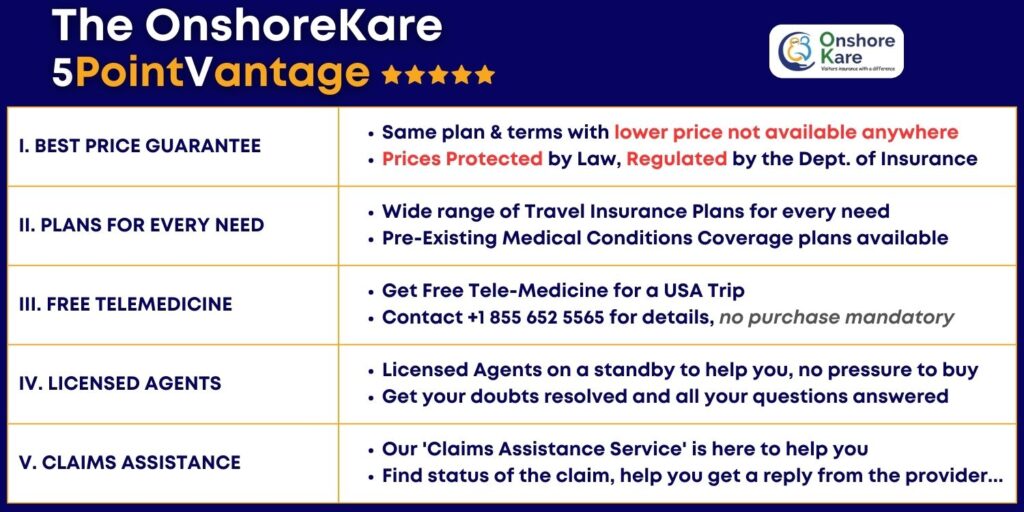
United Healthcare PPO Network For Visitors Insurance
United Healthcare PPO network is a popular medical network in the United States. Many top-rated visitor insurance plans provide access to the UHC PPO Network.
When you buy visitor’s insurance for the USA you are buying short-term health insurance for the duration of your stay in the United States.
During the research and buying process, you will come across these terms:
- PPO
- United Healthcare PPO
- FirstHealth PPO
PPO stands for Preferred Provider Organization. PPO is a term specific to the United States’ domestic health plans.
It is worthwhile to note that healthcare in the United States is very expensive.
Watch a short video about United Healthcare PPO Network
What Is A PPO Network?

Preferred Provider Organization (PPO) is a network of many established highly qualified medical practitioners and well-recognized hospitals in the USA to create a network of participating providers.
To create a network of participating providers, United Healthcare Services Inc contracts with medical providers, such as:
- Hospitals
- Clinics
- Pharmacies
- Doctors
- Specialists
A Primary Care Physician (PCP) plays a crucial role in coordinating care within the PPO network, ensuring that patients receive comprehensive and continuous care.
Travel Insurance providers in turn contract with United Healthcare to extend their PPO Network to their visitors’ insurance plans.
Why Use PPO Network?
The policy provides better-discounted rates for medical treatment and services availed in the network.
Is United HealthCare A PPO?
Yes, UnitedHealthcare Insurance Company manages the PPO Network that travel insurance companies use and extends the benefit to their customers.
With the United Healthcare PPO Network, you can use any doctor, clinic, hospital, or healthcare facility in the national network.
How Do I Know If The Policy I Purchased Follows A Network?
- The ID card usually has a logo of the network it participates in
- Most plans have the logo on top of the card
- The card either has the logo of United HealthCare
- The card has the logo of FirstHealth
- The policy document will have details of the PPO
Please note that not all travel health plans offer access to a PPO Network. Read the policy document carefully for the health plan benefits.
FirstHealth is a separate PPO Network and some popular travel insurance companies like International Medical Group have plans providing access to the FirstHealth PPO Network.
United Healthcare Network And Medicare Advantage

United Healthcare PPO Network (UHC PPO) offers a wide network of healthcare providers to its members. Travel Insurance Companies tie up with United Healthcare to provide benefits to their customers and provide them with access to UHC PPO.
UHC PPO is managed by United Healthcare, one of the largest health insurance providers in the U.S. Members have access to a large network of healthcare providers, including:
- Hospitals
- Clinics
- Pharmacies
- Doctors
- Specialists
United Healthcare also offers Exclusive Provider Organization (EPO) plans. These plans allow members to receive care from in-network providers for a fixed copay.
UHC provides two EPO plans: one with a narrow network of providers for specific zip codes in the greater San Francisco Bay area, and another with a broader network of providers throughout California.
Members may need to select a Primary Care Physician (PCP) for one plan but not for the other, and may have different options for coordinating their care and self-referring to specialists based on the plan they choose.
The network of United Healthcare PPO is extensive, with many established and highly qualified medical practitioners and well-recognized hospitals in the USA.
The United Healthcare Services Inc Has In Its Network More Than:
- 1,205,000 plus doctors and health care professionals
- 6,000 plus hospitals
- 67,000 plus pharmacies
Members can have access to these as part of their health coverage, it helps them save money.
United Healthcare PPO allows using doctors, hospitals, clinics, or healthcare facilities in the national network.
The PPO network may provide cashless direct billing, and you may be able to save money by reducing your out-of-pocket costs by visiting a doctor within your PPO.
In general, PPO plans offer both:
- In-Network care and
- Out-of-Network care
For an additional cost, you can use doctors, hospitals, and providers outside of the network (your costs are higher when you go out of network)
Remember:
- When you go into the network, there will be network-negotiated fees for eligible expenses
- If you go out of network, there are no network-negotiated fees
- Direct cashless billing depends upon the respective medical facility providers
Visitors Insurance Cashless Billing:
- Cashless direct billing may work well for domestic health plans
- For visitors’ insurance health plans, cashless billing may not be guaranteed
- You may need to pay upfront for the services and file a travel insurance claim with your travel insurance provider
- Do note that a claim has to be submitted even if cashless billing was extended at a medical facility
- Travel Insurance Claim denied? You can file an appeal
Popular Visitors’ Insurance PPO Plans
- Patriot America Plus (UHC PPO Plan)
- Patriot Platinum International (UHC PPO Plan)
- Atlas America (UHC PPO Plan)
- Atlas Essential America (UHC PPO Plan)
- Safe Travels USA Comprehensive (FirstHealth PPO Plan)
- Safe Travels USA for USA Visitors (FirstHealth PPO Plan)
Visitors’ Insurance PPO Plans For Pre-Existing Medical Conditions And Prescription Drug Coverage
- Visitors Protect Insurance (UHC PPO)
- INF Elite (UHC PPO)
When You Contact A Medical Provider Or Present Your ID Card, What Should You Say?

When you contact a medical provider or present your ID card, Please indicate the PPO Network when you have to use the insurance
The first thing you must say is:
“My Insurance uses the United Healthcare PPO network and I found your name on the network search“
When You Contact A Medical Provider Or Present Your ID Card, What Should You Avoid Saying?
When you contact a medical provider or present your ID card you can avoid saying “I have XYZ Insurance” Or “I have XYZ Plan”.
Providers might not be aware of all the plans and plan names and in this confusion, your insurance may not be accepted.
Out-of-Network Provider

An out-of-network provider refers to a healthcare provider who has not contracted with your insurance company for reimbursement at a negotiated rate
Here are some key points to understand about out-of-network providers:
- Reduced Payment: Insurance companies often discourage their members from seeking care from out-of-network providers by offering reduced payment rates to providers who are part of their network. This incentivizes providers to join their network and accept the negotiated rates.
- Higher Costs: When you receive care, your costs are generally higher compared to in-network care. This can include higher deductibles, copayments, and coinsurance, as well as the potential for limited or no coverage for certain services.
- Limited Coverage: Depending on your health insurance plan, expenses incurred for services provided by out-of-network providers may not be covered, or may only be partially covered by your insurance company. It’s important to review your plan’s coverage details to understand the extent of coverage for out-of-network care.
- Balance Billing: Out-of-network providers can balance bill patients for the remainder of the charges after the insurance company has paid its share. This means that you may be responsible for paying the difference between the provider’s charges and the amount covered by your insurance.
- Exceptions and Appeals: In some cases, you may be able to appeal to your insurance company to cover out-of-network care, especially if it is medically necessary and there are no in-network providers available. However, there is no guarantee that the appeal will be granted.
It’s important to carefully review your health insurance plan’s network and coverage details to understand the implications of seeking care from out-of-network providers.
This can help you make informed decisions about your healthcare and manage your costs effectively.
Understanding Provider Networks

A provider network is a list of health care providers, including doctors, hospitals, and other healthcare providers and medical facilities.
A health care services provider contracts with them , to provide medical care to its members at negotiated rates for services to insured of certain medical insurance plans. These lists of contracted providers make up medical provider networks.
Insurance providers contracts with such health care service providers to extent their network access to their customers (the insured person)
Providers that are included in a payer’s network are considered “in-network,” while ones that aren’t are considered “out-of-network”.
Insurers often have different provider networks for different health plans.
Preferred Provider Networks Exist For Several Reasons:
- Quality of Medical Care: Health insurance companies offer PPO Plans to ensure quality standards for their customers. PPO Networks assure of the quality of medical care to its members (i.e., patients or enrollees) For instance, doctors who want to be part of a network must meet certain qualifications and agree to provide care at a certain rate.
- Cost Control: Provider networks help control healthcare costs by negotiating lower rates with providers in exchange for a larger volume of patients
- Predictable Medical Expenses: Provider networks help patients find healthcare providers that are covered by their insurance plan and reduce the risk of unexpected medical bills
Frequently Asked Questions
Which Medical Travel Insurance To Choose PPO Or No PPO?
The choice between a PPO or non-PPO plan depends on your specific needs and preferences.
If you prioritize flexibility and a broader choice of providers, a PPO plan may be worth considering. However, if you prefer the option to visit any provider without network restrictions, a non-PPO plan may be more suitable.
It’s important to compare the coverage, costs, and limitations of different plans to find the best fit for your medical travel insurance needs.
In general PPO plans are popular as they give access to a reputable network.
Which Are The Best PPO Travel Insurance Plans For Visitors To The USA?
The most popular plans are:
Atlas America and Patriot America Plus are comprehensive coverage visitor insurance plans that cover 100% of the costs within the PPO network
However, if you go outside of the PPO network, Patriot America Plus will pay 80% of $5,000, then 100% of the policy maximum, while Atlas America will still pay 100% of the policy maximum
Are There Alternatives To Travel Insurance Plans?
You can opt for the Travel Assistance membership program for your international trip with guaranteed cashless claims via medical concierge Like:
Hop! is Travel Assistance Membership Program for international trips that provides:
- Medical Assistance
- Emergency Consultation Services
- Travel, Legal, & Personal Assistance
- Including coverage for Pre-existing Conditions
for international travelers, traveling anywhere worldwide outside their home country.
Which Is The Best Fixed Coverage Visitor Insurance PPO Plan?
While there is nothing as the best plan and it depends on the individual and their insurance needs, you can explore the following plans:
- Visitors Care: Visitors Care is a fixed coverage visitor insurance plan that participates in a PPO network. This plan provides coverage for medical emergencies, including hospitalization, emergency medical evacuation, and repatriation.
- INF Premier: If you need coverage for pre-existing conditions for your USA trip, you can explore this plan.
It’s recommended to carefully review the plan details, network providers, and associated costs to make an informed decision.
Is It Worth Getting A PPO Plan?
PPO plans offer greater flexibility and choice in healthcare providers, but they may come with higher costs.
Whether a PPO plan is worth it depends on individual healthcare needs, preferences, and financial considerations.
It’s recommended to carefully review the plan details, network providers, and associated costs to make an informed decision.
What Are Provider Networks?
A network made up of Hospitals, Doctors, and other healthcare providers and facilities who have agreed to offer services to insured persons (of certain medical plans) at a negotiated rate.
Why Do Insurance Companies Provide Access To networks?
Insurance companies provide access to network control for several reasons, including:
- Cost Control
- Quality Control
- Convenience
- Cost Saving
Overall, insurance companies provide access to networks to control costs, ensure quality care, and provide convenience and cost savings to their members.



